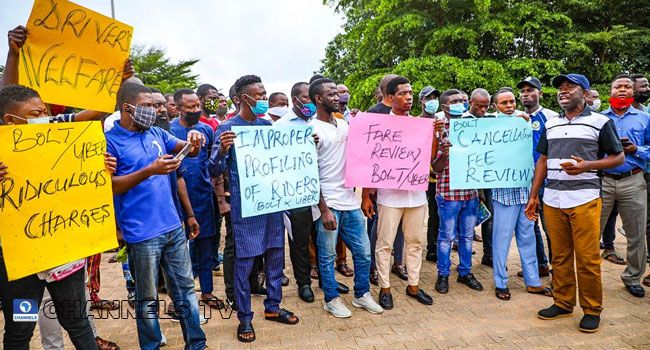Protest; Uber, Bolt Drivers Condemn Slow Implementation Of Ride-Hailing Regulation In Kenya

It has been reported that the slow implementation of the Digital Taxi Hailing Regulation in East Africa Kenya has caused Uber and Bolt riders to take to the streets in protest.
The unsatisfied drivers express their disappointment in protest on the street of Nairobi. Their actions left thousands of passengers deserted, the passengers were left to pay ridiculous amounts of transportation fees as they face scarcity.
The ride-hailing drivers accuse the country’s transportation regulating body, the National Transport and Safety Authority (NTSA), of deliberately slowing down the implementation of the regulation that has been approved since June 2022.
The chairman of a coalition of ride-hailing drivers, Digital Partners Society (DPS), Rhayn Kanyandong, condemned the NTSA for its failure to implement the regulation even after it was enacted 90days before.
As a result of the previous protest by drivers, the government have been working on the enacted regulation since 2016. The regulation seeks to halt commission charges at 18%. Ride-hailing platforms currently charge between 20-25% per trip across the nation, especially on the Uber and Bolt platforms.
The drivers perceive the lagging implantation process as the advantage of the ride-hailing companies, as their earnings are protected. The companies had gone to court to seek a regulation annulment.
Uber had released a petition, in its opinion, the regulation will frustrate investment in the company, likewise obstruct the growth in the country. “The introduction of 18% as the ceiling for the allowable commission has the potential to stifle innovation and reduce the petitioner’s economic feasibility of investing in the market,” this is according to the petition.
In a recent interview, Brian Njao, Uber’s Country Manager said “Uber is not against the NTSA regulations; we believe that they will be effective in streamlining the sector. However, we are against the capping of the commission. It will cut our revenue and force the company to reconsider its investments in the country.”
Kenya is not the only country ride-hailing drivers have raised a placard across the continent. Drivers in South Africa also took to the streets in August to demand a reduction in commission charges from 25% to 10%.
